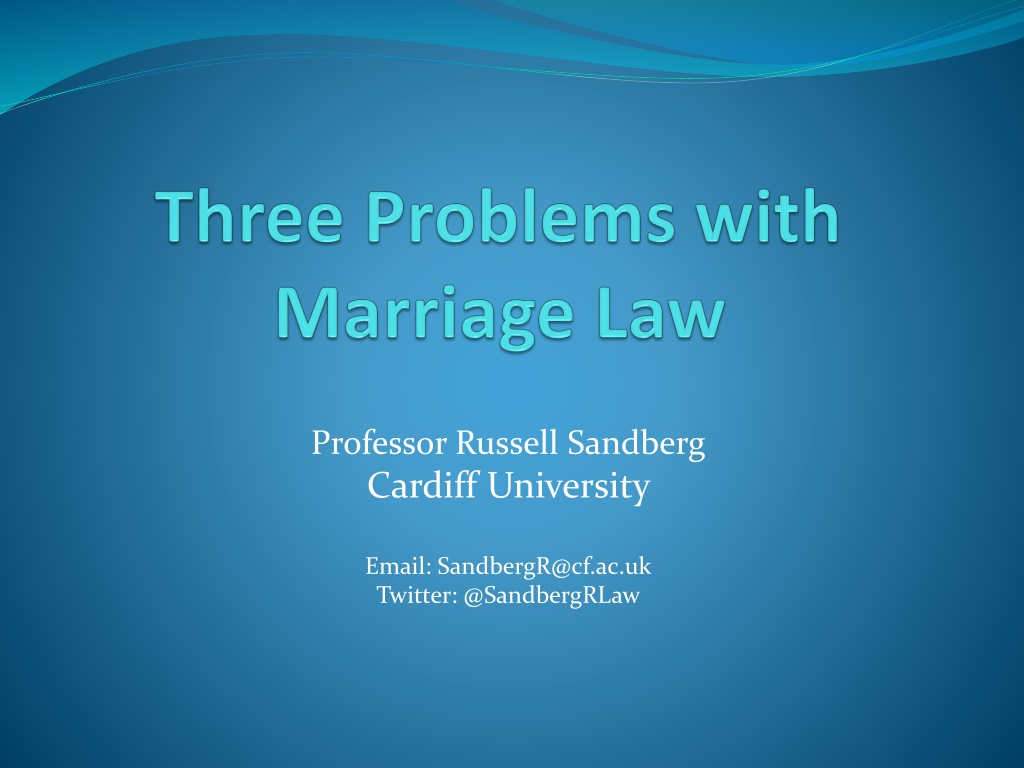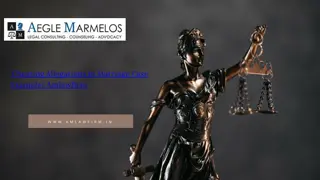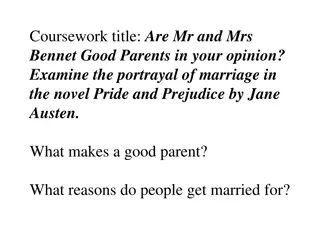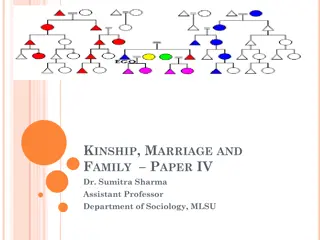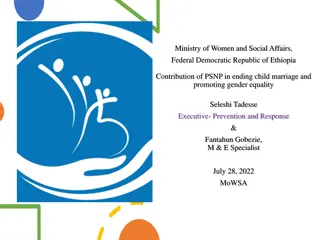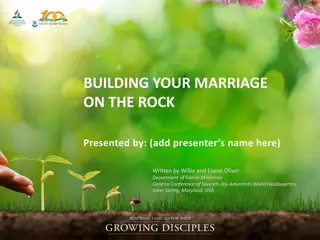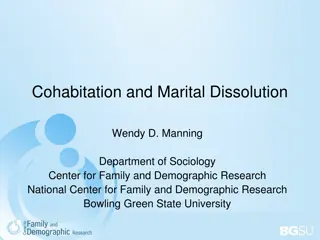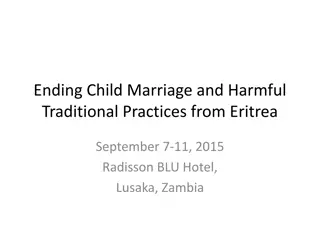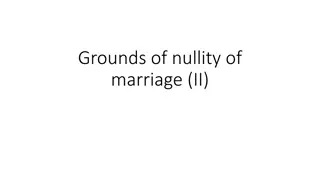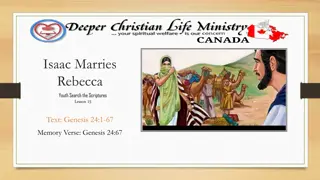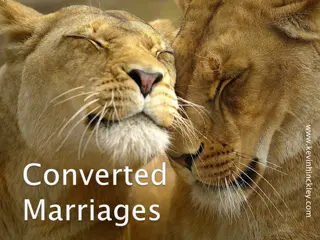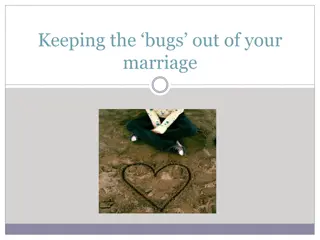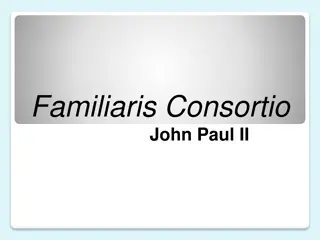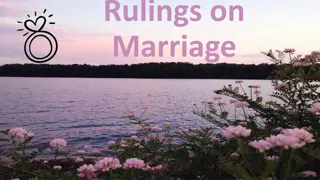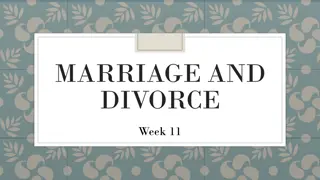Changing Trends in Marriage and Relationships in the UK
Marriage rates in the UK have significantly declined since 1972, with religious ceremonies decreasing to the lowest percentage on record. Cohabitation has increased, and misconceptions about common-law marriage prevail. Various intimate adult relationships now exist outside the Marriage Act 1949, including cohabiting couples and non-religious belief marriages.
Download Presentation

Please find below an Image/Link to download the presentation.
The content on the website is provided AS IS for your information and personal use only. It may not be sold, licensed, or shared on other websites without obtaining consent from the author.If you encounter any issues during the download, it is possible that the publisher has removed the file from their server.
You are allowed to download the files provided on this website for personal or commercial use, subject to the condition that they are used lawfully. All files are the property of their respective owners.
The content on the website is provided AS IS for your information and personal use only. It may not be sold, licensed, or shared on other websites without obtaining consent from the author.
E N D
Presentation Transcript
Professor Russell Sandberg Cardiff University Email: SandbergR@cf.ac.uk Twitter: @SandbergRLaw
The marriage rate by 2017 (the number of marriages per 1,000 unmarried men and women aged 16 years and over) has decreased by 75% for men and by 69% for women since 1972 to be the lowest on record (since 1862) and the number of marriages of opposite-sex couples has decreased by 45%. While in 1900 religious ceremonies accounted for 85% of all marriages and were 49% of all marriages by the late 1970s, by 2017 only 22% of all marriages were religious ceremonies, the lowest percentage on record, with civil marriages having outnumbered religious marriages every year since 1992.
The proportion of non-married women aged 18 to 49 who were cohabiting increased from one in ten in 1979 to over a third in 2011. 21.9% of those living in a couple were now cohabiting and amongst those aged 16 to 29 years this figure rose to 69.2%. Moreover, the common law marriage myth remains prevalent with a British Social Attitudes Survey conducted in 2018 showing that almost half those surveyed (46%) explicitly agreed with the incorrect statement that couples who live together for a period of time have a common law marriage which gives them the same rights as married couples .
A number of intimate adult relationships now exist outside the Marriage Act 1949:
A number of intimate adult relationships now exist outside the Marriage Act 1949: Cohabiting couples
A number of intimate adult relationships now exist outside the Marriage Act 1949: Cohabiting couples Unregistered religious marriages
A number of intimate adult relationships now exist outside the Marriage Act 1949: Cohabiting couples Unregistered religious marriages Non-religious belief marriages
number of intimate adult relationships now exist outside the Marriage Act 1949: ohabiting couples Unregistered religious marriages Non-religious belief marriages
Different issues: Non-religious marriages gap in law Unregistered religious marriages no gap in law but law indirectly discriminates
The Marriage Act 1949 differentiates between marriages solemnised according to the rites of the Church of England / Church in Wales and marriages otherwise solemnised. This second category of marriages otherwise solemnised includes: (1) civil marriages in a register office or in approved premises; (2) marriages according to the usages of the Society of Friends ; (3) marriages between a man and a woman professing the Jewish religion according to the usages of the Jews ; and (4) marriages in any place of worship registered under the Places of Worship Registration Act 1855 and section 41 of the Marriage Act 1949.
Different issues: Non-religious marriages gap in law Unregistered religious marriages no gap in law but law indirectly discriminates Same Effect: Ceremonies not legally binding so if want legally recognised marriage then need civil ceremony Otherwise n0t entitled to legal support on relationship breakdown Risk if this is not an autonomous and free decision
Part One: The Problem of Unregistered Religious Marriages Part Two: The Problem of Non-Religious Belief Marriages Part Three: Possible Solutions
Part One: The Problem of Unregistered Religious Marriages
Possible Reasons for non-Registration The law may be unduly complex or restrictive (and this requires law reform). There may be a choice not to have a civil marriage on the part of one or both parties: observant Muslims often have a nikah just so that they can be together without being chaperoned. It might result from unawareness that the religious marriage is not registered (and this requires education, increased awareness). It may not be a voluntary decision by one of the parties.
Concern about unregistered religious marriage has been raised by several empirical studies. Cardiff research (2011) found that over half of the cases dealt with by the Sharia Council in our study involved couples who had either not married under English civil law or had married abroad and whose marital status in English law was unclear. This was problematic in that such couples had no choice other than to resolve dispute themselves or take it to sharia council which was no longer a form of alternative dispute resolution http://www.law.cf.ac.uk/clr/research/cohesion.html
The absence of a registered civil marriage in addition to the Nikah ceremony has led to a number of Muslim women, after a Muslim divorce, being deprived of any recourse to the matrimonial financial legislation available in the UK, and being therefore treated as having been in a state of cohabitation with their partner Report of the Commission on Religion and Belief in British Public Life (CORAB)
A significant number of Muslim couples fail to register their religious marriages [and so they have] no option of obtaining a civil divorce Independent Review into the Application of Sharia Law in England and Wales
The proposed offence would penalise celebrants any person who knowingly and wilfully purports to solemnize a marriage . This would do little to deal with the issue of unregistered religious marriages for a number of reasons:
This offence ignores the reasons why religious marriages may not be registered. The issue is not that celebrants are deliberately failing to or colluding not to register marriages. The issue is that some couples are deciding either deliberately or accidentally to have a religious marriage that does not comply with the law on marriage registration.
Possible Reasons for non-Registration The law may be unduly complex or restrictive (and this requires law reform). There may be a choice not to have a civil marriage on the part of one or both parties: observant Muslims often have a nikah just so that they can be together without being chaperoned. It might result from unawareness that the religious marriage is not registered (and this requires education, increased awareness). It may not be a voluntary decision by one of the parties. In any of these situations, using the criminal law against a celebrant (assuming a celebrant can be identified) does not deal with the issue.
Akhter v Khan: Case brought concerning unregistered religious marriage (intended to register but husband then refused) At first instance the family court judge favoured a flexible interpretation of the law on validity, but this ultimately did not find favour with the Court of Appeal
All weddings would be required to take place in the presence of one authorised officiant who would be responsible for ensuring that the legal requirements are met. The officiant could be, but would not need to be, the celebrant. Weddings would take place according to the form and ceremony chosen by the parties and agreed by the officiant. This could include weddings outside. The only requirement would be that the parties should be required to express their consent to be married.
Law Commissions proposals would mitigate the problem of unregistered religious marriages by removing requirements that indirectly discriminate against some religious groups. This would reduce numbers of unregistered marriages those which occur because of the strictness of the law or because couples are not aware of those requirements.
So, some unregistered religious marriages would still exist and in some cases, this would not be an autonomous and free choice (either at the time or later on if the relationship changes).
Part Two: The Problem of Non-Religious Belief Marriages
Under marriage law there is a firm distinction between religious and civil marriage: Civil weddings must be solemnised in the presence of the Superintendent Registrar and Registrar. There is no option of having an authorised person from a non-religious organisation. No religious service can be used in civil ceremonies and a building with a recent or continuing religious connection cannot be an approved premises . This means that ceremonies solely conducted by belief organisations and Independent Celebrants are also outside current marriage law.
The Marriage Act 1949 differentiates between marriages solemnised according to the rites of the Church of England / Church in Wales and marriages otherwise solemnised. This second category of marriages otherwise solemnised includes: (1) civil marriages in a register office or in approved premises; (2) marriages according to the usages of the Society of Friends ; (3) marriages between a man and a woman professing the Jewish religion according to the usages of the Jews ; and (4) marriages in any place of worship registered under the Places of Worship Registration Act 1855 and section 41 of the Marriage Act 1949.
R (on the Application of Hodkin) v Registrar General of Births, Deaths and Marriages 2013] UKSC 77 I would describe religion in summary as a spiritual or non-secular belief system, held by a group of adherents, which claims to explain mankind s place in the universe and relationship with the infinite, and to teach its adherents how they are to live their lives in conformity with the spiritual understanding associated with the belief system .
R (on the Application of Hodkin) v Registrar General of Births, Deaths and Marriages 2013] UKSC 77 Lord Toulson held that the exclusion of secular belief systems was appropriate because there are other legal provisions which allow for secular wedding services on approved premises. However, such ceremonies need to be civil and conducted in the presence of Superintendant Registrar and Registrar.
A humanist wedding differs from a civil wedding in that it is entirely hand-crafted and reflective of the humanist beliefs and values of the couple, conducted by a celebrant who shares their beliefs and values, and can take place in any venue that is special to them. (2018)
Reform Proposals Aborted reform under New Labour. Lord Harrison s Marriage (Approved Organisations) Bill 2012-13: recognition to all religious and non- religious groups without a registered place of worship provided that they were registered as a charity for the advancement of religion or belief and of good repute.
Marriage (Same Sex Couples) Bill Committee Stage: Identical amendment made. Government rejected good repute test and said Bill not the right vehicle for such reform. Report Stage: amendment for humanism only tabled on Government s recommendation. AG argued that such a focus would breach ECHR. Committee Stage (HL): amendment for non-religious belief systems. Baroness Stowell: of course everyone would support humanist marriages but that it would require a change in law that would have implications that have not yet been fully thought through .
Report Stage: amendment to pass Regulations within 6 months for non-religious belief marriage rejected but amendment to hold a review and power to make provision to then allow such marriages passed. This became section 14 of the Marriage (Same Sex Couples) Act 2013, which defined belief organisation as an organisation whose principal or sole purpose is the advancement of a system of non-religious beliefs which relate to morality or ethics .
Majority in favour of law change but it would be difficult or impossible to apply certain types of criteria without the risk of discriminating against some belief organisations. Over to Law Commission ...
Clear need for reform but there was no simple solution that would solve the range of problems in the law that we have identified. Any steps to form the law to accommodate marriages by non- religious organisations needed to take place alongside a broader updating of the law of marriage that seeks to address a number of long-standing problems . Need for a full Law Commission Report.
2015: Law Commission publishes scoping paper. Government declines to act. 2019: Government announces two year long Law Commission project. September 2020: Law Commission consultation paper published. Late 2021: Full Law Commission Report due.
2015: Law Commission publishes scoping paper. Government declines to act. 2019: Government announces two year long Law Commission project. Rather than waiting for comprehensive reform proposals, Humanists sought immediate reform through private members Bills and litigation September 2020: Law Commission consultation paper published. Late 2021: Full Law Commission Report due.
The current non-recognition of humanist marriage interfered with the applicant s human rights ...
The current non-recognition of humanist marriage interfered with the applicant s human rights ... ... but was justified by the fact that the law was currently under review by the Law Commission.
All weddings would be required to take place in the presence of one authorised officiant who would be responsible for ensuring that the legal requirements are met. The officiant could be, but would not need to be, the celebrant. The following could be officiants: (1) registration officers; (2) Anglican clergy; (3) nominated officiants from any religion or belief body; (4) independent officiants who apply directly to the General Register Office or Registrar General.
The Law Commissions proposed definition of non- religious belief organisation is: An organisation that professes a secular belief system that claims to explain humanity s nature and relationship to the universe, and to teach its adherents how they are to live their lives in conformity with the understanding associated with the belief system (para 3.43). It would need to be considered whether the definition of a non-religious belief organisation should be limited further, by a list of exclusions of the types of group that would not qualify to nominate officiants, such as political parties, trade unions, or sporting organisations (para 3.43)
For both religious and non-religious organisations alike that there should be three further requirements (para 3.44): at least 20 members who meet regularly for worship or in furtherance of their beliefs ; 2. the organisation should have a wedding service or a sincerely held belief about marriage ; 3. need to consider whether there should be an express exclusion preventing organisations from nominating officiants if the organisation promotes purposes that are unlawful or contrary to public policy or morality 1.
If independent celebrants can go straight to the General Register Office then it could be asked, why should religion or belief officiants be denied that opportunity and be required to operate through their organisation and so be subject to further regulation concerning their organisation rather than themselves? Why should a religious leader of a faith of just nineteen members be denied the right to solemnise marriages while an independent celebrant who represents just themselves has that power?
Welcomes the Law Commissions move away from buildings but queries the definition of belief. Two options: 1. Employ a more rigorous definition of belief Or: 2. Open up nominations to all organisations (rather than just religion or belief organisations) so to include most (or all) independent celebrants too.
A More Rigorous Definition (of Belief or Organisation) The (Irish) Civil Registration Act 2004 provides a definition of secular body which could be used here to define belief organisation or organisation .
(a) it has no fewer than 50 members (b) its principal or sole purpose is not the solemnisation of marriage [or purpose is the advancement of a system of spiritual beliefs which relates to morality or ethics] (c) members of the body meet regularly in furtherance of the objects (d) it does not have rules regarding marriage or the solemnisation of marriage that contravenes the requirements of this Act or any other enactment or rule of law (e) it is a body which, on the date of making its application, has been in existence for a continuous period of no less than five years (f) it has appropriate procedures in writing for selecting, training and accrediting members as fit and proper persons to solemnise marriages. (g) it maintains a register of its members
None of the following is an organisation for the purposes of this Act: (a) a political party, or a body that promotes a political party or candidate (b) a body that exists mainly to promote a political cause (c) a trade union or representative body of employers (e) a chamber of commerce (f) a body that promotes purposes that are (i) unlawful, (ii) contrary to public morality, (iii) in support terrorism or terrorist activities, or (v) for the benefit of an organisation membership of which is unlawful
